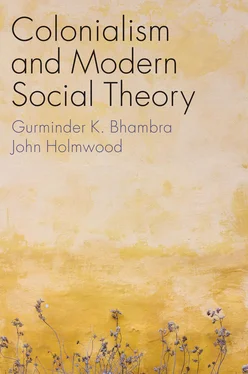Given this set of challenges, Parsons’s sociological settlement appeared to be wanting. Sociologists grew more interested in the dynamics of class, and it did not immediately appear to be a problem that class was understood to be ‘race-blind’. Du Bois, for example, especially in later life, was sympathetic to Marxism, and this attitude was to become common among many African American scholars after him. The reason is not too difficult to understand. In 1944 Gunnar Myrdal had published a commissioned report into race in the United States, The American Dilemma , using in it the terminology of caste – as had Du Bois himself earlier – to explain racialised hierarchies. Myrdal anticipated that American democratic values – the ‘American creed’ – would ultimately prevail and resolve these inequalities. In this respect, Myrdal represented an ‘optimistic’ interpretation, believing that the American creed was hostile to all status differences, including those of class (Myrdal 1962 [1944]: 671). However, among African American sociologists after Du Bois, the language of ‘caste’ used by Myrdal was criticised along with his idea that the American creed would enable the resolution of racialised hierarchies. ‘Class’, by contrast, could be understood as a universalisable term and concept, one that could appeal to a common condition across racialised differences (see Robinson 1983).
By the late 1960s, however, many African American writers were using the language of colonialism rather than that of class to understand local experience in the United States and to articulate a new Black Power movement (see Carmichael and Hamilton 1967). Yet, as Blauner (2001 [1971]) argued, the analysis of colonialism as integral to the construction of race relations in the United States and elsewhere was largely absent from sociology. When Giddens turned to a reinterpretation of Marx, Weber, and Durkheim, it was with the intention of reinvigorating ‘the analysis of trends of development within the “advanced” societies’ (Giddens 1971: 246) and of casting doubt on the ‘implicit assumption that the main characteristics of the “developed societies” are known ’ (246). He wrote further that, ‘paradoxically, in taking up again the problems with which they were primarily concerned, we may hope ultimately to liberate ourselves from our present heavy dependence on the ideas which they formulated’ (247). As we will argue throughout the book, however, the ‘problems’ taken up in the past also cover topics that are neglected and misrepresented in the present more than they were in the past. 6
Decolonising European Social Theory
Calls to decolonise the university in the 1960s were part of wider movements of decolonisation, especially in East Africa (Mamdani 2019). They involved challenges both to the western curriculum and to the nature of academic recruitment and training. Such initiatives were typically seen as ‘anti-western’, and it is only recently that a self-critical movement to decolonise the university has emerged in the western academy itself (Bhambra, Nişancioǧlu, and Gebrial 2018). The impetus of this movement comes largely from Africa, via the examples of the Rhodes Must Fall and Fees Must Fall movements in South Africa. This book takes up one aspect of the wider discussion. It addresses the colonial context in which the contemporary European understanding of modern social theory has been formed. It takes seriously the histories that created the context for the development of these ideas and the ways in which these colonial histories were elided in subsequent discussions.
We place firmly within their times the theorists with whom we engage, and we discuss their writings in the light of the histories they were living through. Our purpose is to ‘decolonise’ the concepts and categories they have bequeathed to us. This is a process of contextual understanding and reconstruction. We do not claim to provide an exhaustive account of their writings on other topics. We are instead drawing attention to omissions in the secondary literature, and thus to the processes of ‘purification’ that have removed colonialism and empire from sociological understandings of modernity. In consequence, our purpose is to contribute to what Connell (1997: 1539) calls the ‘genre of commentary and exposition’, which constitutes the canon by reconstructing it from within.
Just as the enterprise of decolonising the curriculum would be purely scholastic if it did not address the inequalities and forms of domination that structure the wider society as well as the university, our concerns are also with the wider issues. The ‘lead’ societies of modernity (Parsons 1971) are currently beset by populism and xenophobic hostility to minorities and migrants. These social divisions are as urgent now as those of gender and class had appeared to be in the period of the postwar settlement. Indeed, they disrupt aspects of that settlement and the ways in which the categories associated with it have been understood. For much of the period of post-Second World War developments in European and US sociology, the Cold War and the ultimate demise of the Soviet system constituted the framing international issue. As Hansen (2002) argues, decolonisation was neglected and yet had a profound significance, even for those issues that were regarded as central. For example, a figure of the white working class has emerged across Europe and the United States and functions as a resonant category of analysis for the left behind, in explanations of both the 2016 UK referendum for leaving the EU and the election of Trump as president of the United States (Shilliam 2019). Yet the working class in these countries is not just white. Current sociology is implicated in these constructions precisely because it has neglected the roles of colonialism and empire. The tradition needs to be reconstructed and made to address current problems. The history of sociology and of its various self-understandings is bound up with wider histories that have produced our present moment.
Our book focuses on five key sociological figures of the nineteenth and early twentieth century: Tocqueville, Marx, Weber, Durkheim, and Du Bois. In the context of how European social theory is conventionally understood, our treatment of Marx, Weber, and Durkheim needs no further explanation. Tocqueville is not usually part of the sociological canon. Nevertheless, we argue that he is a major source for arguments about the significance of democracy to modernity, especially in the twin contexts of the 1776 US Declaration of Independence and 1789 French Revolution. More importantly, his less known discussion of slavery and of the treatment of indigenous people has serious implications for the development of that democracy and for how it is understood. For example, Tocqueville’s arguments about the role of the movement of populations from Europe to the United States and its consequences for freed African Americans resonate with Du Bois’s subsequent account of the colour line, in spite of their different sensibilities (see pp. 69–70 in this volume).
The inclusion of Du Bois has a different justification. Absence from the canon, as Toni Morrison (1989: 12) notes, does not imply an absence of processes associated with exclusion; rather it should cause us to interrogate the intellectual manoeuvres that are required to erase entire peoples from histories and societies that seethe with their presence. Morrison argues that, whereas canons can appear to be ‘naturally’ or ‘inevitably’ white, in fact they are ‘studiously’ so (14). As Francille Wilson (2006) and Aldon Morris (2015) have pointed out, Du Bois was actively excluded from the wider conversation of the academy in the United States. This was a consequence of the segregated nature of academic life there, as well as of the hostility that Du Bois received from community leaders such as Booker T. Washington. As a result, his contribution to the broader topics of sociology was not acknowledged at the time; only recently has his importance been more widely recognised. While Du Bois was extensively debated by intellectuals in his community, few white sociologists were citing scholars across the colour line, and not even his active political leadership gained him wider recognition. The partial desegregation of academic life has brought African American thought into the conversation, but the reason for including Du Bois is not simply to incorporate a once neglected voice. It is to pay attention to what the development of his thought can tell us about the nature of contemporary social problems.
Читать дальше












